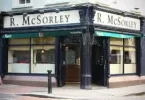Crisis? What Crisis?
The Minister for Small Business John Perry TD opened a recent Small Firms Association Conference by referring to the various initiatives taken by his colleague the Minister for Finance Michael Noonan to make the banks fit for purpose resulting in the Temporary Partial Loan Guarantee Scheme and the Microfinance Fund which, he promised, should be up-and-running by the third quarter of the year.
While the legislation for the former has gone through the Dail before the Summer recess, it’s understood that the banks want closer examination of the legal detail and the Microfinance Bill is likely to take even longer, perhaps before the end of October or November. Some believe we’ll be luck to have either of them up-and-running by Christmas.
With pubs closing in Ireland at the rate of one every 48 hours, according to a study recently commissioned by Molson Coors Ireland it was found that 42 per cent of publicans are unhappy with the level of support from their banks during the recession to date.
In the meantime, two reports, one from the Central Bank and the other from ISME have indicated that our banks are a long way from being ‘fit for purpose’.
The most recent report, The Central Bank’s Irish SME credit supply and demand: comparisons across surveys and countries, finds that the Irish rejection rate for credit applications is the second highest in the euro area.
Central Bank report
The Central Bank report found that Ireland also has the second highest share of ‘discouraged borrowers’ (firms discouraged from applying for a loan despite requiring credit) in the euro area. Changes in terms and conditions associated with new bank credit in Ireland are also among the least favourable in the euro area.
Commenting on this report the Irish Hotels cited recent findings from its own quarterly industry barometer (July 2012) where 39 per cent of hoteliers experienced difficulties accessing standard/normal credit facilities from their banks over the last year.
“The Government must do more to ensure banks facilitate the economy by supplying much-needed credit to viable businesses.” stated IHF Chief Executive Tim Fenn, “The Government must do more to ensure banks facilitate the economy by supplying much-needed credit to viable businesses.”
ISME’s report
His sentiments find a sympathetic voice at the Association of Irish Small & Medium Enterprises which pointed out recently that while demand for credit from the banks remains steady, the number of refused credit applications rose by four percentage points to 54 per cent, according to the its last Quarterly credit survey (March to May).
ISME received 706 responses which tapped into what it describes as “the real SME lending environment” to find:-
* 54 per cent of companies who applied for funding in the last three months were refused credit by their banks, a deterioration on the 50 per cent figure in the previous quarter
* 37 per cent of respondents had requested additional or new bank facilities in the last three months, showing an increase from 31 per cent in the same quarter of 2011
* 82 per cent of businesses who applied for funding outlined that the banks are making it more difficult for them to access finance
* 87 per cent of respondents are customers for over five years while 44 per cent have been customers for over 20
* Of the 46 per cent approved for funding, 65 per cent have drawn down the finance either fully or in part
* 48 per cent of requests were for overdrafts with 46 per cent for term loans or alterations to existing facilities
* 46 per cent experienced an increase in charges and 33 per cent an increase in their interest rate
* 53 per cent were ‘micro-businesses’, 36 per cent ‘small’ and 11 per cent were ‘medium’ enterprises
As a result of the findings ISME called on the Government to intervene at board and management level in both bailed-out banks to ensure that they are servicing the economy and lending to viable SME businesses.
And ISME Chief Executive Mark Fielding did not pull his punches.
“It may suit the Administration to believe the fiction created by bankers’ spin that the system is functioning and it suits bankers to maintain this fiction” he stated, “otherwise why sink billions of taxpayers’ money into keeping them afloat? The reality is that banks are performing at a very limited capacity in ensuring the payments system and ATMs are functioning; however when it comes to assisting the SME sector to grow, the bailed-out banks are continuing to make it difficult for SMEs to access finance therefore hindering the economy.
“It’s not good enough for politicians or their civil servants to say that they will not intervene and that they ‘leave banking to the bankers’. The bailed-out banks are not fixed, rescued bankers continue to utter untruths, banking reform is delayed and banking policy is turning good business bad. The Government, the owners, must take a more hands-on approach while the system is broken, insist on opening credit lines, servicing SME customers and play their part in economic recovery. Otherwise business will stagnate, employment will reduce and the economy will suffer for a generation.”
ISME’s survey also showed that some 96 per cent believe that the Government is not making a positive difference to SME lending, a deterioration from the 92 per cent reported in the previous quarter.
ISME went on to point out that not only are banks continuing to refuse viable businesses credit but the ‘lucky few’ who manage to secure finance and even those who have not needed finance in this quarter are being “screwed” by increases in bank interest and charges.
“This is an inevitable consequence of a reduction in competition in the banking sector and will continue unabated in the absence of new entrants or Government intervention,” stated ISME. “The Government’s long-fingering of the introduction of the Strategic Investment Bank is another example of lack of action on the banking front.
“The banks are protecting themselves at the direct cost, not only to small and medium enterprises, but to the whole economy. While this Government waffles and dithers about bank interventions, SMEs are being terrorised and ultimately shut down by discredited bailed-out bankers, arrogant at top level and ignorant at branch level.”
He continued, “This Administration must act now and install active management into the banks, representing the owners, the taxpayers, to ensure honest reporting, sustainable reform and a return to proper banking.”
ISME has called on Government to:-
* Install better management in bailed-out banks to oversee lending policy and its activity
* Insist on honest and reliable reporting from the rescued banks through the Central Bank
* Introduce the Government Partial Guarantee scheme and the Microfinance scheme
* Develop the alternative bank – a Strategic Investment Bank to introduce competition
* Investigate other sources of finance that can be made available to viable cash-starved SMEs.
And Mark Fielding had a parting shot for the banks: “In September 2008 the then Government was misled by the bankers about the true state of their institutions. Despite being found out as, at best, mistaken incompetents and at worse self-serving liars, the Government continues to persist with a naive belief that the banks have the ‘good of the economy’ at the centre of their policies and insist on a hands-off approach. This attitude will only prolong the cycle of greed and malpractice in the banking sector and delay any economic recovery, dependent on SME-sustainable investment, growth and the resultant job creation.”
Licensed trade’s lending crisis
The LVA is also examining the banking crisis.
“The lack of capital means there’s no turnover of pubs taking place as there’s no funding available” LVA Chairman David Madigan explained to Drinks Industry Ireland recently, “so young publicans cannot get into the market and the receivers appointed to the hotels and pubs are having an adverse effect on the entire market.
“You can take it that the industry has lost 30 per cent of its turnover in the past three to five years”.
The VFI too, is feeling the banking pinch.
“From our perspective the banks, despite all their protests to the contrary, are just not lending,” stated VFI Chief Executive Padraig Cribben, “Not alone are they not extending credit, there are many instances of overdraft facilities being reduced or withdrawn totally. For too long now we have been listening to noises from the relevant authorities that the banks ‘will be brought into line’. The evidence suggests this is merely hot air and that the banks are still capable – and guilty – of thumbing their noses at those in authority and indeed at their owners.”
IBF view
Needless to say, the Irish Banking Federation sees things differently. It refers to the recent Department of Finance SME Lending Demand Study for the period October 2011 to March 2012 which indicates that 72 per cent of requests for credit were fully or partially approved (when applications pending are excluded).
Despite being contradicted by the more recent Central Bank report, the IBF believes that this study highlights “the importance of reliable information and the banks continued support for SMEs”.
The IBF stated, “The importance of reliable information is further underlined by the Study’s finding that the perception that banks are not supportive of SMEs is based less on personal experience and more on information from sources such as business representative groups”.
However the Oireachtas Joint Committee on Finance, Public Expenditure & Reform is to consider the recent Central Bank report on bank lending to SMEs when it meets this month.
Committee Chairman Alex White TD commented, “In the light of conflicting statements and reports on the incidence of bank lending to small businesses, I am proposing to hold Committee hearings on this issue in order as far as possible to establish the true position.
“It is striking that the Central Bank report has been so flatly rejected by the banking industry and there is a need to get to the bottom of this controversy. I will propose that we hear from the Central Bank and also from representatives of the commercial banks and the SME sector. We will also consider the Mazars report, commissioned by the Department of Finance.
“The availability of credit is essential to small business and as the Committee responsible for the banking sector we are determined to ensure that there is a full airing of this issue in the interests of all concerned.”
Should prove an interesting airing.








